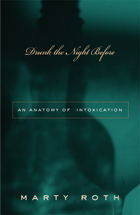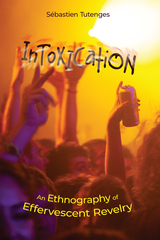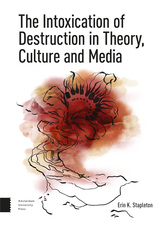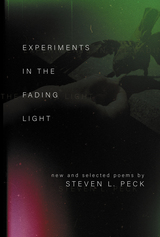3 books about Intoxication

Drunk the Night Before
An Anatomy of Intoxication
Marty Roth
University of Minnesota Press, 2005
This invigorating work traces the cultural history of convivial drinking before the concept of addiction overshadowed intoxication's reputation as a creative, philosophical, and spiritual force. Marty Roth's Drunk the Night Before illustrates altered consciousness from myth to contemporary life, laying bare the behaviors and beliefs, sacred and secular, invested in intoxication. From the days of antiquity to the twentieth century, Roth follows the often veiled language of intoxication through religion and aesthetics, poetry and art, popular festivals and film. In this sweeping work, he examines the cultural roots of love potions and the fountain of youth, drunkenness in Hollywood cinema, the religious concept of a spiritual high versus the condemnation of intoxication. Roth reinvigorates the currently rebuffed connection between intoxication and artistic creativity, taking up by turn the poet Anacreon and the canon of drink poetry - from classical Greek to the European lyric, Euripides' Bacchae and the figure of Socrates in Plato's Symposium, the heavy investment of Western philosophy in intoxication, and the concepts of the carnivalesque in Friedrich Nietzsche and Mikhail Bakhtin. At once deeply erudite and irresistibly congenial, this encyclopedic work makes critical sense of the long history of alcohol as potion and poison, as pharmakon and catalyst, revealing altered states as the hidden thread in the story of sensation and Western cultural consciousness.
[more]

Intoxication
An Ethnography of Effervescent Revelry
Sébastien Tutenges
Rutgers University Press, 2023
For two decades, Sébastien Tutenges has conducted research in bars, nightclubs, festivals, drug dens, nightlife resorts, and underground dance parties in a quest to answer a fundamental question: Why do people across cultures gather regularly to intoxicate themselves?
Vivid and at times deeply personal, this book offers new insights into a wide variety of intoxicating experiences, from the intimate feeling of connection among concertgoers to the adrenaline-fueled rush of a fight, to the thrill of jumping off a balcony into a swimming pool. Tutenges shows what it means and feels to move beyond the ordinary into altered states in which the transgressive, spectacular, and unexpected take place.
He argues that the primary aim of group intoxication is the religious experience that Émile Durkheim calls collective effervescence, the essence of which is a sense of connecting with other people and being part of a larger whole. This experience is empowering and emboldening and may lead to crime and deviance, but it is at the same time vital to our humanity because it strengthens social bonds and solidarity.
The book fills important gaps in Durkheim’s social theory and contributes to current debates in micro-sociology as well as cultural criminology and cultural sociology. Here, for the first time, readers will discover a detailed account of collective effervescence in contemporary society that includes: an explanation of what collective effervescence is; a description of the conditions that generate collective effervescence; a typology of the varieties of collective effervescence; a discussion of how collective effervescence manifests in the realm of nightlife, politics, sports, and religion; and an analysis of how commercial forces amplify and capitalize on the universal human need for intoxication.
This book is also freely available online as an open access digital edition.
Download the open access ebook here.
Vivid and at times deeply personal, this book offers new insights into a wide variety of intoxicating experiences, from the intimate feeling of connection among concertgoers to the adrenaline-fueled rush of a fight, to the thrill of jumping off a balcony into a swimming pool. Tutenges shows what it means and feels to move beyond the ordinary into altered states in which the transgressive, spectacular, and unexpected take place.
He argues that the primary aim of group intoxication is the religious experience that Émile Durkheim calls collective effervescence, the essence of which is a sense of connecting with other people and being part of a larger whole. This experience is empowering and emboldening and may lead to crime and deviance, but it is at the same time vital to our humanity because it strengthens social bonds and solidarity.
The book fills important gaps in Durkheim’s social theory and contributes to current debates in micro-sociology as well as cultural criminology and cultural sociology. Here, for the first time, readers will discover a detailed account of collective effervescence in contemporary society that includes: an explanation of what collective effervescence is; a description of the conditions that generate collective effervescence; a typology of the varieties of collective effervescence; a discussion of how collective effervescence manifests in the realm of nightlife, politics, sports, and religion; and an analysis of how commercial forces amplify and capitalize on the universal human need for intoxication.
This book is also freely available online as an open access digital edition.
Download the open access ebook here.
[more]

The Intoxication of Destruction in Theory, Culture and Media
A Philosophy of Expenditure after Georges Bataille
Erin K. Stapleton
Amsterdam University Press, 2022
This book examines the desire for, and intoxication with destruction as it appears in cultural objects and representation, arguing that all cultural and aesthetic value is fundamentally predicated on its own fragility, as well as the living transience of those who make and encounter it. Beginning with a philosophy of expenditure after Georges Bataille, each chapter maps different operations of destruction in media and culture. These operations are expressed and located in representations of human extinction and explosive architecture, in execution and in eroticism, and in media and digital archives, which constitute a further destabilization of the notion of destruction in the dynamic between aspirational immortality and material volatility embedded in the archival systems of digital cultures.
[more]
READERS
Browse our collection.
PUBLISHERS
See BiblioVault's publisher services.
STUDENT SERVICES
Files for college accessibility offices.
UChicago Accessibility Resources
home | accessibility | search | about | contact us
BiblioVault ® 2001 - 2025
The University of Chicago Press









